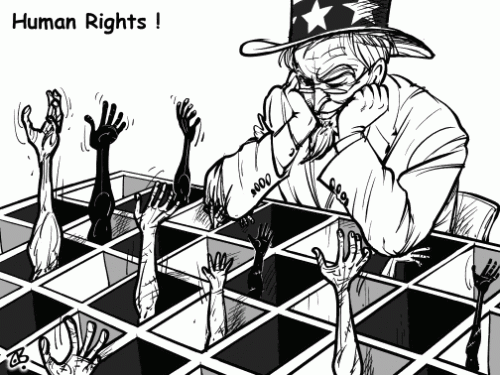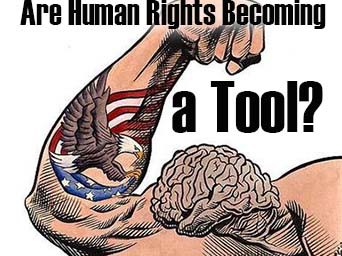jeudi, 12 décembre 2013
Ukraine, Turkey and America’s Selective Human Rights Rhetoric

Ukraine, Turkey and America’s Selective Human Rights Rhetoric
|
Ex: http://www.strategic-culture.org |
|
The US government was quick to condemn its Ukrainian counterpart for the brutality of police in Kiev against pro-European Union demonstrators after the Ukrainian government’s suspension of negotiations on closer association with the EU. According to the website of the US Embassy in Ukraine, Washington «condemns the violence against protesters on Independence Square», and «urge(s) the government of Ukraine to respect the rights of civil society and the principles of freedom of speech and freedom of assembly… « The «spirit of the principles embodied by the OSCE» is cited as the basis for the statement. Flash back to May and June in Turkey, which, like Ukraine, is also a member of the Organization for Security and Co-operation in Europe (OSCE). Over a period of several weeks, police cracked down on crowds of demonstrators many times the size of those in Kiev, using truncheons, water cannon and tear gas, injuring hundreds and ultimately killing half a dozen. A small group of environmentalists had staged a sit-in in central Istanbul to protest the uprooting of trees and the planned paving of a park to build another shopping mall. Social media and blogs took the lead in capturing Turkish police brutality sparked by defenseless tree-huggers, because almost no international news outlets covered the upheaval in any depth for the better part of a week. When international media did start covering the Turkish disturbances properly, Western governments were largely silent. The White House and State Department never criticized the Turkish government for heavy-handedness. The only sharply worded criticism came from non-governmental entities like the Council of Europe, a human rights body. The current regime in Turkey has arrested and imprisoned hundreds of suspected opponents: journalists, lawyers and military officers. Many are held without charge, qualifying them as political prisoners. Ukraine has one high-profile political prisoner, former Prime Minister Yulia Tymoshenko, jailed under vague «abuse of power» charges but undeniably involved in high-level corruption dating back to the 1990s, when the patronage of then-Prime Minister Pavlo Lazarenko (now in prison in California) allowed her to corner the domestic natural gas market. Tymoshenko is certainly a political rival of President Viktor Yanukovych, and yet Western governments and the international human rights community have singled out Tymoshenko’s detention as evidence of «selective justice» in Ukraine. No such demonization of Erdogan’s Turkey has occurred, despite mass arrests and jailing of suspected conspirators. This is interesting in part because the two countries’ domestic politics parallel each other in many ways. Both countries «straddle» east and west, with markedly different populations characterizing extreme eastern and western regions. The opponents of the current authorities in both states are largely «urban liberals», who see themselves confronting an «eastern mentality» and provincial social forces. In Ukraine, Yanukovych and his Party of the Regions come from the Russian-speaking east and southeast, and many in Kiev and the Ukrainian-speaking west of the country despise them for not viewing Russia and its president as enemies. In Turkey, urban, secular Turks perceive Prime Minster Recep Tayyip Erdogan’s Justice and Development Party (AKP) government as bigoted and male chauvinist, and fear that the AKP seeks to impose traditional Islamic morality on all of Turkish society. Meanwhile, Ukraine languishes across the Black Sea, its naïve government coming away disappointed and empty-handed from talks with more «civilized» EU leaders, and its opposition crying that the government has «stolen» the people’s «European dream». But Yanukovich and the other Ukrainian leaders must have thought their country of 45 million – with a territory the size of France and the most fertile soil in Europe – was worth more than Brussels’ paltry offer. No doubt it was. It’s just that the EU, beset by huge problems of unemployment, recession and social malaise, can’t possibly afford to pay for Ukraine’s overhaul and integration into the economic bloc right now. So Ukraine is naturally turning back to Russia, a vast country representing the historical and present-day lifeblood of its economy, for better trade benefits and debt relief. That it has taken the Ukrainians years of negotiations and ultimate humiliation to reach this decision probably has much to do with the global economic downturn of the last five years. The vocal negative reaction of the US and EU is almost certainly attributable to geopolitical perceptions still rooted in the outdated mentality of the Cold War. But one thing should be certain: in the wake of the Turkish upheaval of 2013, Washington’s indignation over police brutality – such as what has occurred over the last few days in Kiev – is hollow and phony. It is truly selective, and has nothing to do with human rights… Chad Nagle lives in Washington, DC. He has lived and worked in Ukraine and Turkey as a human rights monitor, lawyer and teacher. |
00:05 Publié dans Actualité, Affaires européennes | Lien permanent | Commentaires (0) | Tags : politique internationale, ukraine, turquie, états-unis, droits de l'homme |  |
|  del.icio.us |
del.icio.us |  |
|  Digg |
Digg | ![]() Facebook
Facebook



 But for all this, Ukraine comes in for harsh criticism; Turkey does not. This may be because Turkey’s government employs powerful lobbyists like Patton Boggs to enforce its interests on Capitol Hill., and US investment in Turkey – including the US military presence – is substantial. Whenever a Congressional resolution on recognizing the Armenian Genocide comes up for a vote, a few intimidating phone calls to the White House and members of the House and Senate quickly and quietly sink it, leaving America quivering on one side of the historical debate, while Canada, France, Germany, Italy, Russia and a host of other major powers appear unafraid to take an official stand.
But for all this, Ukraine comes in for harsh criticism; Turkey does not. This may be because Turkey’s government employs powerful lobbyists like Patton Boggs to enforce its interests on Capitol Hill., and US investment in Turkey – including the US military presence – is substantial. Whenever a Congressional resolution on recognizing the Armenian Genocide comes up for a vote, a few intimidating phone calls to the White House and members of the House and Senate quickly and quietly sink it, leaving America quivering on one side of the historical debate, while Canada, France, Germany, Italy, Russia and a host of other major powers appear unafraid to take an official stand.
Les commentaires sont fermés.